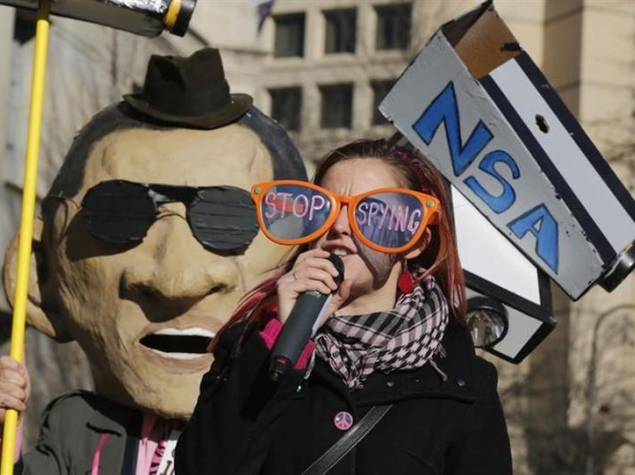- Home
- Internet
- Internet News
- US Can Keep Court Orders, Phone Companies Secret in NSA Spy Case
US Can Keep Court Orders, Phone Companies Secret in NSA Spy Case

U.S. District Judge Yvonne Gonzalez Rogers in Oakland, California, rejected the Electronic Frontier Foundation's argument that the U.S. Department of Justice should turn over the materials, in the wake of unauthorized disclosures last year by a former National Security Agency contractor, Edward Snowden.
The EFF noted that the government had already declassified hundreds of pages of other documents discussing data collection under the U.S. Patriot Act, including some that the data privacy advocacy group had requested. These declassifications came after Snowden's leaks had been revealed.
Rogers, though, said disclosing orders of the Foreign Intelligence Surveillance Court, which handles federal requests for surveillance warrants, could "provide a roadmap" for targets of national security investigations to evade surveillance.
She also said the government's disclosure of "general" information about the call record collection program did not mitigate the "inherent risks to national security and government investigations" of revealing the phone companies' identities.
"Official confirmation of the existence of or general information about an intelligence program does not eliminate the dangers to national security of compelling disclosure of the program's details," she wrote.
The EFF had also argued that statements by people affiliated with the government, including a former member of a technology review panel who said "telephone companies like Sprint, Verizon, and AT&T" were required to turn over records to the NSA, justified the disclosures.
"We're disheartened that the court is allowing the government to keep the information secret," EFF staff lawyer Mark Rumold said in an interview. "It is quite likely that the government is still using the Patriot Act to obtain information, under different intelligence programs, in bulk."
The EFF will review whether to appeal, he added.
Rogers ruled in the EFF's favor on one issue, ordering the government to turn over a Jan. 4, 2010 memo discussing the interaction between the Patriot Act and the disclosure of information collected when compiling the census.
A Justice Department spokeswoman declined to comment.
Snowden's leaks have sparked a broad debate over the government's authority to collect personal data without violating people's privacy.
On Monday, the U.S. Office of the Director of National Intelligence released partially blacked-out versions of 38 documents relating to a now-discontinued NSA program to collect bulk electronic communications metadata.
The case is Electronic Frontier Foundation v. Department of Justice, U.S. District Court, Northern District of California, No. 11-05221.
© Thomson Reuters 2014
Get your daily dose of tech news, reviews, and insights, in under 80 characters on Gadgets 360 Turbo. Connect with fellow tech lovers on our Forum. Follow us on X, Facebook, WhatsApp, Threads and Google News for instant updates. Catch all the action on our YouTube channel.
Related Stories
- Samsung Galaxy Unpacked 2026
- iPhone 17 Pro Max
- ChatGPT
- iOS 26
- Laptop Under 50000
- Smartwatch Under 10000
- Apple Vision Pro
- Oneplus 12
- OnePlus Nord CE 3 Lite 5G
- iPhone 13
- Xiaomi 14 Pro
- Oppo Find N3
- Tecno Spark Go (2023)
- Realme V30
- Best Phones Under 25000
- Samsung Galaxy S24 Series
- Cryptocurrency
- iQoo 12
- Samsung Galaxy S24 Ultra
- Giottus
- Samsung Galaxy Z Flip 5
- Apple 'Scary Fast'
- Housefull 5
- GoPro Hero 12 Black Review
- Invincible Season 2
- JioGlass
- HD Ready TV
- Latest Mobile Phones
- Compare Phones
- Tecno Pova Curve 2 5G
- Lava Yuva Star 3
- Honor X6d
- OPPO K14x 5G
- Samsung Galaxy F70e 5G
- iQOO 15 Ultra
- OPPO A6v 5G
- OPPO A6i+ 5G
- Asus Vivobook 16 (M1605NAQ)
- Asus Vivobook 15 (2026)
- Brave Ark 2-in-1
- Black Shark Gaming Tablet
- boAt Chrome Iris
- HMD Watch P1
- Haier H5E Series
- Acerpure Nitro Z Series 100-inch QLED TV
- Asus ROG Ally
- Nintendo Switch Lite
- Haier 1.6 Ton 5 Star Inverter Split AC (HSU19G-MZAID5BN-INV)
- Haier 1.6 Ton 5 Star Inverter Split AC (HSU19G-MZAIM5BN-INV)






![[Partner Content] OPPO Reno15 Series: AI Portrait Camera, Popout and First Compact Reno](https://www.gadgets360.com/static/mobile/images/spacer.png)









